Musculoskeletal and medical conditions like back pain, arthritis, and repetitive strain injuries are incredibly common in workplaces. The good news? Supporting employees with these conditions isn’t complicated, and it brings real benefits to your business. Let’s explore eight ways that you, as an employer, can create a workplace where everyone can thrive.
Why This Matters for Your Business
Here’s something that might surprise you: it is estimated that 1 in 4 adults in Ireland lives with some form of musculoskeletal condition, and this increases if you take into consideration medical conditions. That means several of your current employees are likely managing these challenges right now, whether you know it or not.
When you support these employees properly, something wonderful happens. They become more engaged, more productive, and more loyal to your company. The accommodations usually cost very little (often under €500), but the return on investment is substantial. You’ll see fewer sick days, lower staff turnover, and happier employees across the board.
Think about it this way: it’s much cheaper to support an experienced employee than to recruit and train someone new. Plus, employees who’ve learned to adapt and problem-solve often bring valuable skills to your team.

Getting Recruitment Right
Supporting employees with musculoskeletal / medical conditions starts before they even walk through your door. When writing job descriptions, focus on what the role actually involves, the essential tasks, rather than unnecessary physical requirements.
Instead of saying “must be able to lift heavy boxes,” ask yourself: is lifting really essential to this job? Could we provide a trolley or ask someone else to help? If manual handling is an essential task, include maximum loads to be lifted. Be specific about what’s truly needed, and you’ll attract better candidates while staying on the right side of equality legislation.
During interviews, don’t ask about health conditions – it’s not allowed under Irish equality law anyway. If a candidate mentions a condition, that’s fine. Focus on how they’d approach the role and what support they might need to do their best work.
Pre-employment medicals with your occupational health physician or advisor can help ensure that accommodations can be made for employees that may require it, prior to commencing the role.
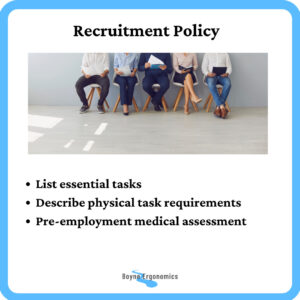
Simple Changes That Make a Big Difference
Most workplace accommodations are surprisingly straightforward. An ergonomic assessment might reveal that a €300 chair or adjustable desk can solve someone’s back problems completely. A special keyboard and mouse can make all the difference for someone with upper limb issues.
Flexible working arrangements often work brilliantly. Maybe someone needs to start later to manage morning stiffness, or work from home on days when their condition flares up. Remote working became the norm during COVID-19, so we know many roles can be done from anywhere.
Sometimes it’s about redistributing or rotating tasks. If someone struggles with heavy lifting, can a colleague help out or can lifting aids be provided? If standing for long periods is difficult, can they take regular breaks or have a stool to perch on?
Small environmental changes help everyone. Better lighting reduces eye strain, temperature controls help people whose conditions are affected by weather, and accessible parking spaces closer to the building entrance make a real difference to someone’s day.
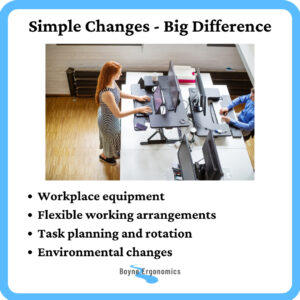
Creating Clear, Supportive Policies
Your policies should be easy to understand and follow. Make it clear that employees can request support at any time, and that all conversations will be kept confidential. Designate someone in HR as the go-to person for accommodation requests – someone who understands the process and can respond quickly.
Set realistic timelines. Aim to respond to accommodation requests within two weeks and implement solutions within a month where possible. Create simple forms that employees can use, but don’t make the process overly bureaucratic.
Your attendance policy should recognize that some employees may need extra flexibility for medical appointments or bad days with their condition. Consider allowing people to make up time, work different hours, or use annual leave for medical needs.
When it comes to performance reviews, focus on results rather than how someone gets their work done. If they’re meeting their targets and contributing to the team, it shouldn’t matter whether they’re sitting, standing, or taking regular breaks.
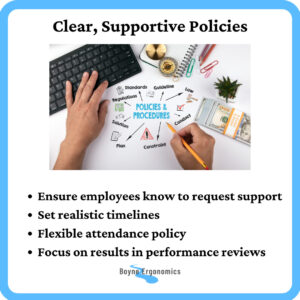
Supporting Your Managers
Your front-line managers are key to making this work. They need to understand their role in supporting employees and know when to involve HR or occupational health professionals.
Train your managers on the basics: how to respond when someone asks for support, how to keep medical information confidential, and how to focus on solutions rather than problems. Many managers worry unnecessarily about costs or complexity when most accommodations are simple and affordable.
Help them understand that employees with musculoskeletal conditions often develop excellent problem-solving skills and resilience. These qualities benefit entire teams and shouldn’t be overlooked.

Integrating Health and Wellbeing
Consider how musculoskeletal and overall health fits into your broader employee wellbeing initiatives. Could you offer on-site physiotherapy sessions or ergonomic assessments? What about lunch-time talks on managing back pain or setting up a home office properly?
Partner with local healthcare providers or occupational health services. The HSE offers resources, and there are excellent private providers throughout Ireland who specialize in workplace health.
Make sure your wellbeing activities are inclusive. Instead of step-counting challenges that exclude some people, think about broader health goals like better sleep, stress reduction, or healthy eating that everyone can participate in.
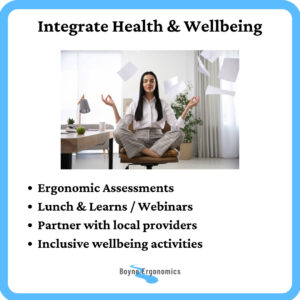
Understanding Your Legal Obligations
Under Irish law, particularly the Employment Equality Acts and the Disability Act, you have duties to provide reasonable accommodation for employees with disabilities. But here’s the thing – going beyond the minimum legal requirements usually benefits everyone.
The Irish Human Rights and Equality Commission provides excellent guidance on workplace accommodations. Keep good records of your accommodation process, but store medical information separately from personnel files and limit access to those who need to know.
Consider working with employment law specialists or occupational health consultants to ensure you’re getting this right. It’s an investment that protects both your employees and your business.
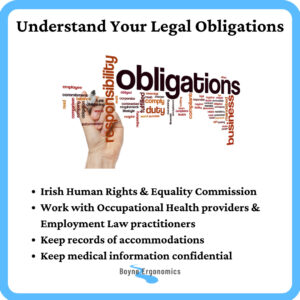
Measuring What Works
Track how well your support programs are working. Monitor accommodation requests, how quickly you implement them, and employee satisfaction scores. Look at retention rates, sick leave patterns, and productivity measures to spot trends.
Regular employee surveys can give you valuable feedback on workplace accessibility. Consider anonymous suggestion systems where people can share ideas for improvements or raise concerns without worry.
Use this information to keep improving. If you’re getting lots of requests for standing desks, maybe it’s time to make them available to everyone. If one department has more musculoskeletal issues, look at whether there are environmental factors you can address.
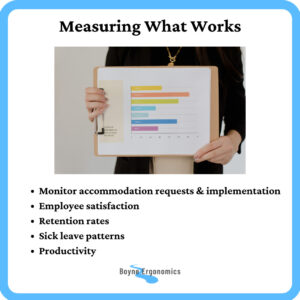
Building an Inclusive Culture
Supporting employees with musculoskeletal / medical conditions is about more than policies and equipment – it’s about creating a workplace where everyone feels valued and included.
Leadership commitment is essential. When senior managers visibly support accommodation initiatives and allocate proper resources, it sends a clear message about company values.
Share success stories (with permission, of course). When accommodations work well, celebrate that success. Show how supporting individual employees has improved overall workplace efficiency and team morale.
Create an environment where asking for help is seen as being proactive, not problematic. Encourage open communication while respecting that employees aren’t obligated to share personal medical information.
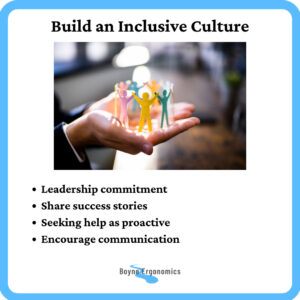
Looking Forward
Supporting employees with pre-existing musculoskeletal and medical conditions isn’t just the right thing to do – it’s smart business. The accommodations are usually simple and affordable, while the benefits to your company culture, productivity, and reputation are significant.
As Ireland’s workforce ages and becomes more diverse, companies that excel at supporting employees with various health conditions will have a real competitive advantage. They’ll attract better talent, keep experienced employees longer, and build stronger, more resilient teams.
Remember, this isn’t about managing limitations – it’s about helping every employee contribute their best work. When people feel genuinely supported, they give their best in return, creating value that extends far beyond individual accommodations to benefit your entire organization.
The key is to start simple, listen to your employees, and be willing to adapt. You don’t need to have all the answers immediately – just a willingness to work together to find solutions that work for everyone.


